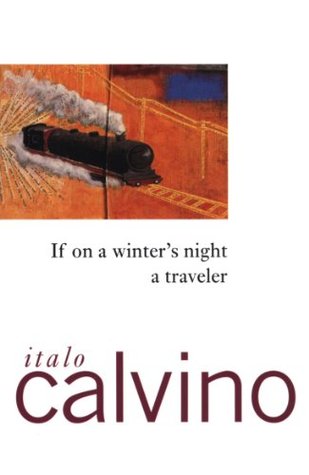More on this book
Community
Kindle Notes & Highlights
The pages of the book are clouded like the windows of an old train, the cloud of smoke rests on the sentences.
Watch out: it is surely a method of involving you gradually, capturing you in the story before you realize it—a trap. Or perhaps the author still has not made up his mind, just as you, reader, for that matter, are not sure what you would most like to read: whether it is the arrival at an old station, which would give you a sense of going back, a renewed concern with lost times and places, or else a flashing of lights and sounds, which would give you the sense of being alive today, in the world where people today believe it is a pleasure to be alive.
the Polish novel Outside the town of Malbork by Tazio Bazakbal.
And so the Other Reader makes her happy entrance into your field of vision, Reader, or, rather, into the field of your attention; or, rather, you have entered a magnetic field from whose attraction you cannot escape.
But something has changed since yesterday. Your reading is no longer solitary: you think of the Other Reader, who, at this same moment, is also opening the book; and there, the novel to be read is superimposed by a possible novel to be lived, the continuation of your story with her, or better still, the beginning of a possible story.
Does this mean that the book has become an instrument, a channel of communication, a rendezvous? This does not mean its reading will grip you less: on the contrary, something has been added to its powers.
I saw myself in the act of presenting her with the iron grapnel as if it were a bunch of flowers: the image in its incongruity had a strident, fierce quality. Certainly a meaning was hidden there that eluded me; and, vowing to meditate on it calmly, I answered yes.
Torn between the necessity to interject glosses on multiple meanings of the text and the awareness that all interpretation is a use of violence and caprice against a text, the professor, when faced by the most complicated passages, could find no better way of aiding comprehension than to read them in the original.
Do you want to demonstrate that the living also have a wordless language, with which books cannot be written but which can only be lived, second by second, which cannot be recorded or remembered? First comes this wordless language of living bodies—is this the premise you wish Uzzi-Tuzii would take into account?—then the words books are written with, and attempts to translate that first language are vain; then . . .
Her way of living in the world, filled with interest in what the world can give her, dismisses the egocentric abyss of the suicide’s novel that ends by sinking into itself.
“Reading,” he says, “is always this: there is a thing that is there, a thing made of writing, a solid, material object, which cannot be changed, and through this thing we measure ourselves against something else that is not present, something else that belongs to the immaterial, invisible world, because it can only be thought, imagined, or because it was once and is no longer, past, lost, unattainable, in the land of the dead . . .”
“Or that is not present because it does not yet exist, something desired, feared, possible or impossible,” Ludmilla says. “Reading is going toward something that is about to be, and no one yet knows what it will be. . . . ”
“The novel I would most like to read at this moment,” Ludmilla explains, “should have as its driving force only the desire to narrate, to pile stories upon stories, without trying to impose a philosophy of life on you, simply allowing you to observe its own growth, like a tree, an entangling, as if of branches and leaves. . . . ”
“There’s a boundary line: on one side are those who make books, on the other those who read them.
You realize at once that Mr. Cavedagna is that person indispensable to every firm’s staff, on whose shoulders his colleagues tend instinctively to unload all the most complex and tricky jobs.
He listens to everybody, though always tormented by the thought of having broken off the conversation with a previous postulant, and as soon as he can he tries to appease the more impatient, assuring them he hasn’t forgotten them, he is keeping their problem in mind.
Some books will remain famous but will be considered anonymous works, as for us the epic of Gilgamesh; other authors’ names will still be well known, but none of their works will survive, as was the case with Socrates; or perhaps all the surviving books will be attributed to a single, mysterious author, like Homer.”
I’m producing too many stories at once because what I want is for you to feel, around the story, a saturation of other stories that I could tell and maybe will tell or who knows may already have told on some other occasion, a space full of stories that perhaps is simply my lifetime, where you can move in all directions, as in space, always finding stories that cannot be told until other stories are told first, and so, setting out from any moment or place, you encounter always the same density of material to be told.
Now you understand Ludmilla’s refusal to come with you; you are gripped by the fear of having also passed over to “the other side” and of having lost that privileged relationship with books which is peculiar to the reader: the ability to consider what is written as something finished and definitive, to which there is nothing to be added, from which there is nothing to be removed.
Are you reading or daydreaming?


